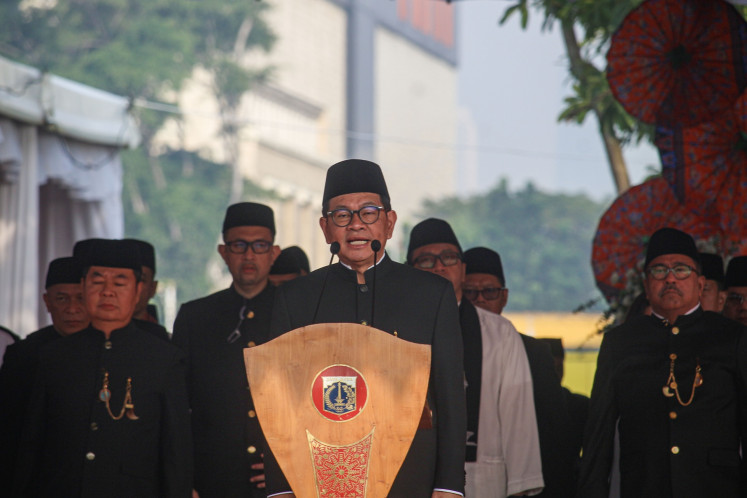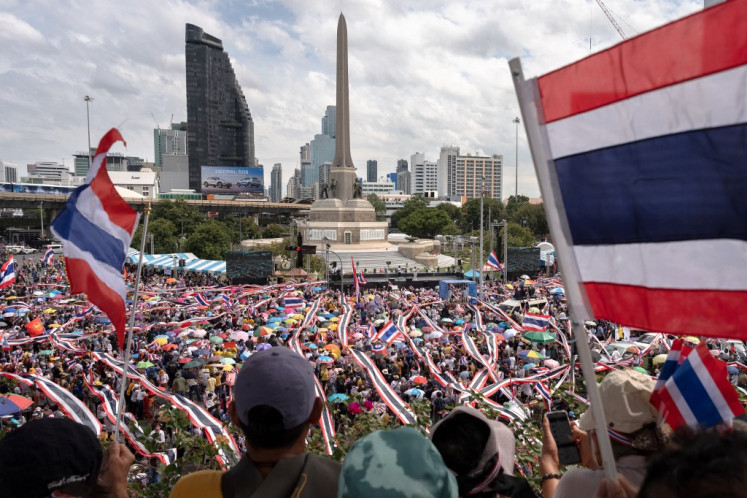Popular Reads
Top Results
Can't find what you're looking for?
View all search resultsPopular Reads
Top Results
Can't find what you're looking for?
View all search resultsMorowali: A tale of China’s grip on rich region
Real steel: A worker walks beside piles of stainless steel slabs produced at the Morowali Industrial Park in Bahodopi district, Morowali, Central Sulawesi, on Oct
Change text size
Gift Premium Articles
to Anyone

R
span class="caption">Real steel: A worker walks beside piles of stainless steel slabs produced at the Morowali Industrial Park in Bahodopi district, Morowali, Central Sulawesi, on Oct. 18. The industrial complex is slated for completion in 2019, when it is expected to have the capacity to produce 3 million tons of stainless steel slabs annually.(JP/Viriya P. Singgih)
A multibillion-dollar injection by Chinese investors into Morowali in Central Sulawesi has turned the backwater into an economic center almost overnight. The Jakarta Post’s Viriya P. Singgih visited the regency last month to look into China’s push to exert its economic might in Indonesia, as the world’s second largest economy strives to turn the regency into the world’s biggest center for integrated nickel-content stainless steel production. Here is the first of two editions of the coverage.
One afternoon in October, two Indonesian workers on their lunch break sat on a stainless-steel platform under a giant, orange gantry crane at the Morowali industrial park, operated by PT Indonesia Morowali Industrial Park (IMIP) in Morowali, Central Sulawesi.
Behind them, three Chinese workers were chatting. Suddenly, an Indonesian worker approached the Chinese workers aggressively, kicked a nearby wall and stared intimidatingly at them. With the motivation unclear, the Indonesian worker then walked away looking irritated.
“That often happens here,” one IMIP staffer, who wished to remain anonymous, told The Jakarta Post.
While IMIP operations provide employment, exclusive treatment for Chinese workers has triggered feelings of alienation among local blue-collar workers. The company pays the Chinese workers far more than their local counterparts, provides them with separate lodgings and a canteen, and prohibits them from roaming around outside the industrial complex.
But for Chinese investors, profits may offset the trouble as Sulawesi is rich in quality nickel, and a lack of government supervision has made it easy for big companies to operate without restraint.
Since 2012, 16 new nickel smelters have been under construction on the island, with Morowali set to become the capital of nickel extraction and processing. Nickel is used widely in mobile phones, cars, food preparation equipment, buildings, steel products and power generation.
Morowali, which covers an area of 5,472 square kilometers, or more or less the same size as Brunei Darussalam, contains at least 370.59 million tons of nickel reserves, enough for decades’ worth of mining.
The regency has long relied on nickel mining to support its economy, despite the much-criticized environmental impact.
A government ban on the export of mineral ores in 2014 profoundly hurt the regency, as miners were forced to stop exporting nickel ore, including to China, their largest market. Morowali’s economy only grew 0.09 percent throughout 2014, according to the Central Statistics Agency (BPS).
But as IMIP’s construction project on a 2,000 hectare site gained traction in 2015 after commencing in the third quarter of 2013, Morowali’s economy has soared, with growth of 67.82 percent in 2015.
IMIP is 75 percent owned by China-based Shanghai Decent Investment Group and 25 percent owned by local mining firm Bintangdelapan Group, which is linked to several retired Army generals, including Lt. Gen. (ret.) Sintong Panjaitan, a former special forces specialist during the reign of president Soeharto.
With IMIP’s huge operation, Morowali is a safe haven for Chinese investors, where local workers come to make a living alongside thousands of illegal Chinese workers, while anti-Chinese sentiment grows in Jakarta and the rest of Java.
Morowali’s Bahodopi district, the center of IMIP’s operations, has been transformed from a desolate mining site with no electricity into a bustling industrial area, where state-owned lender Bank Rakyat Indonesia (BRI) recently saw its branch record the third-largest transaction volume in the archipelago.
“The development has yet to be completed, and we are hiring new workers to ensure timely progress in accordance to the project’s schedule,” IMIP senior vice president for external relations Slamet Viktor Panggabean told the Post recently.
IMIP has set a deadline to complete the industrial complex in mid-2019, and expects to employ between 22,000 and 25,000 workers by then.
As of October, IMIP has employed more than 15,000 Indonesian workers, more than double the number of registered residents in Bahodopi, in its six affiliates and sister companies, that act as tenants on the industrial complex, including ones tasked to construct and operate nickel and steel processing facilities.
At the same time, IMIP also employs around 2,500 Chinese workers, 1,500 of which were categorized as experts and already had proper work permits while the other 1,000 are construction workers with “permits pending.”
However, three IMIP workers interviewed by the Post said the actual number of Chinese workers stood between 5,000 and 6,000.
Working in two shifts a day, it is claimed the Chinese workers work harder than their Indonesian colleagues, and that they are prohibited to set foot out of the complex as some of them are working illegally.
Supervision of the foreign workers is the responsibility of the immigration office in Banggai, a regency located some 700 km from the IMIP site.
The office had only registered 2,031 foreigners in Morowali, while the Morowali Manpower and Transmigration Agency said the central government had granted a quota of 1,223 foreign workers to a number of companies in the regency as of October.
Novly T.N. Momongan, head of the Banggai Immigration Office, admitted the challenges in monitoring the illegal foreign workers after the implementation of the free-visa policy.
“Foreigners holding tourist visas are prohibited from receiving a salary during their visit,” Novly said.
IMIP’s Slamet confirmed that, initially, all of the company’s Chinese workers entered Indonesia using tourist visas, which only last for one or two months.
The Investment Coordinating Board (BKPM) has expressed its concern over the number of unreported Chinese workers at IMIP.
“The company has never explained whether the reported foreigners will work in the construction or production stage,” BKPM third region director Wisnu Wijaya Sudibyo said. “However, it seems like there is a large number of foreign workers that have yet to be reported to us, especially construction workers.”
IMIP government and legal relations head Askurullah argued that there had been discretion from the central government over the use of foreign workers in order to boost the development of the Morowali industrial complex, especially because the complex had been included in the list of national strategic projects.
The discretion, he said, paved the way for IMIP to begin developing the industrial complex without a building construction permit (IMB), in addition to using foreign workers without proper working permits.
“The deal is that we can start the work and then obtain all the necessary permits step by step,” Askurullah said. “The Manpower Ministry has also given the green light for the use of foreign workers.”









